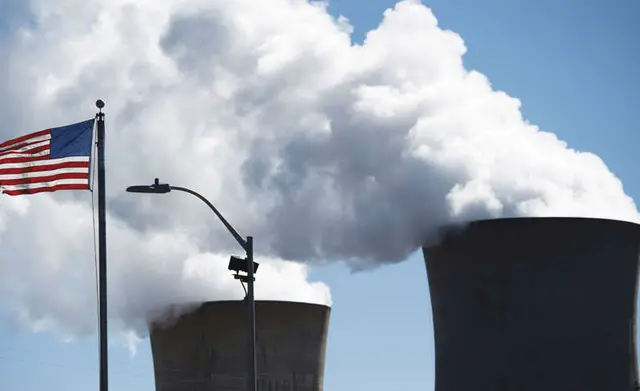A number of key U.S. allies have fixed their eyes on nuclear power as they work to cut carbon emissions and insulate themselves against the economic disruption caused by volatile fossil fuel prices.
Meanwhile, U.S. leaders have struggled to boost the flagging domestic industry. Congress is trying to bolster the nuclear fleet through the bipartisan infrastructure bill, which has spent the last several weeks in limbo after passing the Senate in August. That bill would provide billions in funding to support the demonstration of advanced and small nuclear reactor technology and aid financially compromised nuclear power plants.
Separately, the prospects are murky for help for nuclear in Democrats' partisan budget reconciliation package. A key feature, the clean electricity payment program, would have effectively subsidized nuclear as a zero-emissions power source but was dropped because of opposition from Democratic Sen. Joe Manchin of West Virginia. As a result, legislators are looking for other ways to keep nuclear plants alive, but many liberal Democrats remain skeptical of it and maintain a strong preference for renewable wind and solar.
Elsewhere, U.S. partners in the United Kingdom and France are putting up deadlines and dollar amounts to support the expansion of nuclear power generation. At the same time, a top official in Japan's ruling Liberal Democratic Party has signaled that country's decarbonization targets are out of reach without restarting its closed reactors.
The British government, which committed itself to a target of 100% clean electricity by 2035, is planning for nuclear to be at the core of its power sector in the coming decades. A new "Build Back Greener" strategic plan sets out the U.K.'s goal of securing a final investment decision on a large-scale nuclear plant by the end of the current Parliament.
That plan also includes a proposal to create a new £120 million ($165 million) Future Nuclear Enabling Fund designed "to provide targeted support in relation to barriers to entry" of new projects. The Guardian reported that Prime Minister Boris Johnson's government is likely to help fund a project to build 16 small reactors at 470 megawatts apiece.
"We've got to get back into nuclear. We've got to increase our clean energy generation," Johnson said in an interview earlier this month. "That will bring the cost of energy down and bring down the cost of transport."
Across the channel in France, which has a larger share of nuclear-generated power than any other country in Europe at upward of 70%, President Emmanuel Macron's government has committed to spending $35 billion over the next decade to "reindustrialize" France. Part of that "France 2030" plan involves the deployment of new small nuclear reactors.
"The No. 1 objective is to have innovative small-scale nuclear reactors in France by 2030 along with better waste management," Macron recently told a meeting of business leaders.
One competing force is a standing French government policy to reduce to 50% the share of its electricity generated by nuclear in favor of renewables. Still, the current global energy dynamic has changed things, according to Ted Nordhaus, founder and executive director of pro-nuclear research firm the Breakthrough Institute.
"I think Macron has acknowledged that that's not going to happen and it's unrealistic, and I think that's even clearer now given the huge benefits [of nuclear]," Nordhaus said in an interview, pointing to how the country has fared in recent months while its neighbors who are more reliant on renewable sources, coal, and gas have struggled.
"France is sort of like the one place across Europe that is not in the middle of an energy crisis," Nordhaus said.
There are also signs of a planned nuclear power scale-up in Japan, which shut off most of its nuclear reactors after the Fukushima Daiichi nuclear power plant disaster in 2011.
The secretary-general of the Liberal Democratic Party, Akira Amari, said in a recent debate that Japan's aim to reduce carbon emissions by 46% by 2030 is based on the assumption it will resume operation of 30 reactors.
"Between kind of clearly not having any ability to make any sort of serious commitment on climate without reopening their nuclear fleet, and obviously this sort of global energy shortage that everyone is dealing with — that finally kind of gets Japan over the hurdle" to reopening their plants, Nordhaus said.
"Japan just really does not have many better options," Rich Powell, executive director of right-leaning energy group ClearPath, said of the island nation's clean energy ambitions, pointing to its densely populated and mountainous topography for imposing land-use limits for solar. Japan is also heavily reliant on imports for its coal, oil, and gas supplies.
"There's nothing like an energy crisis to make nuclear look really good," Powell said. "It is predictable and reliable, and once you build up these plants, you get a really good sense of how much it's going to cost and that you're going to be able to rely on the thing for 80 years."
(MSN)
 简体中文
简体中文

